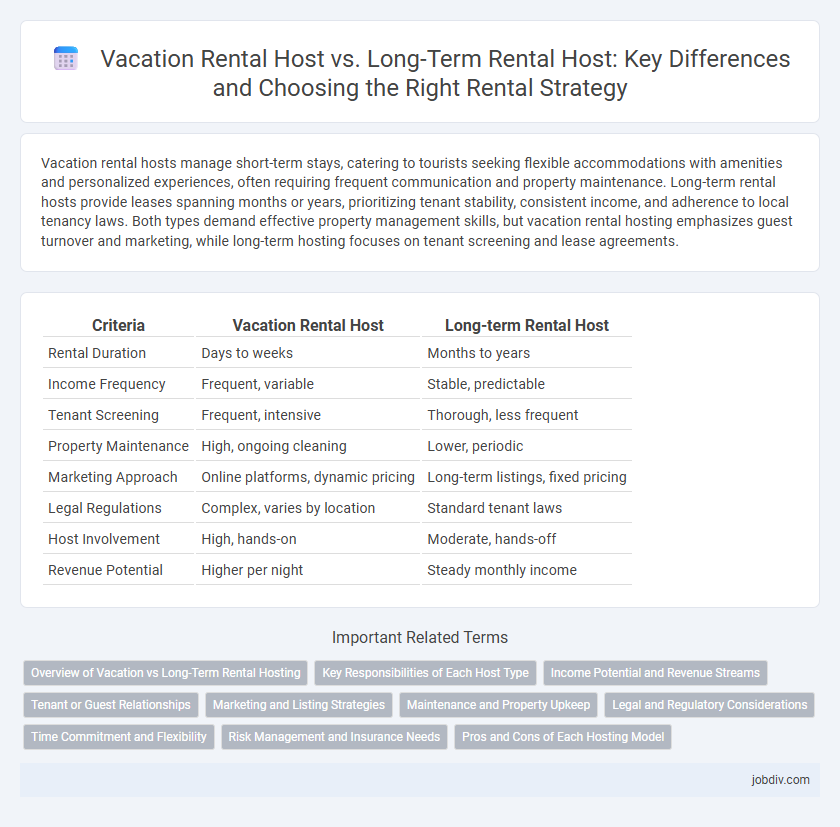Vacation rental hosts manage short-term stays, catering to tourists seeking flexible accommodations with amenities and personalized experiences, often requiring frequent communication and property maintenance. Long-term rental hosts provide leases spanning months or years, prioritizing tenant stability, consistent income, and adherence to local tenancy laws. Both types demand effective property management skills, but vacation rental hosting emphasizes guest turnover and marketing, while long-term hosting focuses on tenant screening and lease agreements.
Table of Comparison
| Criteria | Vacation Rental Host | Long-term Rental Host |
|---|---|---|
| Rental Duration | Days to weeks | Months to years |
| Income Frequency | Frequent, variable | Stable, predictable |
| Tenant Screening | Frequent, intensive | Thorough, less frequent |
| Property Maintenance | High, ongoing cleaning | Lower, periodic |
| Marketing Approach | Online platforms, dynamic pricing | Long-term listings, fixed pricing |
| Legal Regulations | Complex, varies by location | Standard tenant laws |
| Host Involvement | High, hands-on | Moderate, hands-off |
| Revenue Potential | Higher per night | Steady monthly income |
Overview of Vacation vs Long-Term Rental Hosting
Vacation rental hosts typically manage short-term stays, focusing on high guest turnover, dynamic pricing, and enhanced property marketing to attract tourists and travelers. Long-term rental hosts prioritize stable occupancy with leases lasting months or years, emphasizing tenant screening, lease agreements, and consistent rental income. Both hosting types demand distinct management strategies tailored to their market dynamics and guest expectations.
Key Responsibilities of Each Host Type
Vacation rental hosts prioritize guest experience by managing short-term bookings, coordinating cleanings between stays, and providing local amenities and support to enhance the visitor's stay. Long-term rental hosts focus on tenant screening, lease agreement management, and ongoing property maintenance to ensure consistent occupancy and legal compliance over extended periods. Both roles require clear communication and prompt issue resolution but differ in the scale and frequency of guest interaction and property management tasks.
Income Potential and Revenue Streams
Vacation rental hosts often experience higher income potential through dynamic pricing and increased occupancy during peak seasons, leveraging platforms like Airbnb and Vrbo for optimized revenue streams. Long-term rental hosts benefit from stable, predictable income with reduced turnover costs and consistent monthly payments that minimize vacancy risks. While vacation rentals generate varied revenue from nightly rates and additional services, long-term rentals prioritize steady cash flow supported by lease agreements and tenant retention.
Tenant or Guest Relationships
Vacation rental hosts prioritize short-term guest satisfaction by providing personalized, hotel-like experiences and immediate responsiveness to enhance stays. Long-term rental hosts focus on building stable tenant relationships through consistent communication, maintenance, and lease agreement adherence to ensure tenancy longevity. The dynamic nature of vacation rentals demands flexibility in guest interactions, whereas long-term rentals emphasize reliability and trust over extended periods.
Marketing and Listing Strategies
Vacation rental hosts prioritize dynamic marketing strategies leveraging platforms like Airbnb and VRBO, emphasizing high-quality photos, guest reviews, and seasonal pricing to attract short-term travelers. Long-term rental hosts focus on consistent listing presence on sites like Zillow and Apartments.com, highlighting stable lease terms, neighborhood amenities, and competitive monthly rent to appeal to tenants seeking prolonged stays. Both strategies require targeted keywords and compelling descriptions tailored to their respective audience's preferences and booking behaviors.
Maintenance and Property Upkeep
Vacation rental hosts prioritize frequent, thorough maintenance between guest stays to ensure cleanliness and immediate issue resolution, often investing in regular deep cleaning and property inspections. Long-term rental hosts focus on preventive maintenance and periodic repairs to sustain property condition over extended periods, typically scheduling service visits quarterly or biannually. Effective property upkeep for vacation rentals demands rapid turnaround and high guest satisfaction, while long-term rentals emphasize durability and minimizing tenant disruptions.
Legal and Regulatory Considerations
Vacation rental hosts must comply with short-term rental regulations, including obtaining specific permits, adhering to occupancy limits, and paying transient occupancy taxes. Long-term rental hosts face different legal requirements, such as tenant rights protection laws, lease agreement standards, and eviction procedures governed by local landlord-tenant regulations. Understanding these distinct legal frameworks is crucial for hosts to avoid fines, ensure compliance, and maintain successful rental operations.
Time Commitment and Flexibility
Vacation rental hosts manage short-term bookings, often requiring daily availability for guest communication, cleaning, and key exchanges, which demands significant time commitment but offers scheduling flexibility. Long-term rental hosts handle tenants with leases spanning months or years, reducing frequent interactions and maintenance tasks, resulting in less day-to-day time investment. The flexibility in vacation rentals suits hosts seeking dynamic engagement, while long-term rentals appeal to those preferring stable, predictable management routines.
Risk Management and Insurance Needs
Vacation rental hosts face higher risk due to frequent guest turnover and property wear, necessitating comprehensive short-term rental insurance that covers liability, property damage, and loss of income. Long-term rental hosts encounter risks related to tenant default and property maintenance, requiring landlord insurance with robust tenant liability protection and coverage for extended vacancy periods. Both types of hosts must evaluate local regulations and tailor their insurance policies to address specific risk management challenges inherent in their rental model.
Pros and Cons of Each Hosting Model
Vacation rental hosts benefit from higher nightly rates and flexibility in usage but face challenges such as frequent guest turnover and increased cleaning costs. Long-term rental hosts enjoy steady, predictable income with lower management demands but may encounter difficulties with tenant retention and less income potential per month. Choosing between these models depends on balancing income stability against operational intensity and market demand fluctuations.
Vacation Rental Host vs Long-term Rental Host Infographic

 jobdiv.com
jobdiv.com